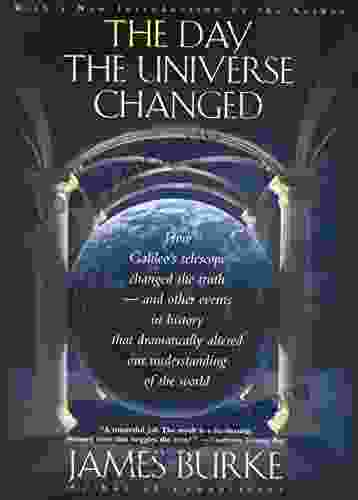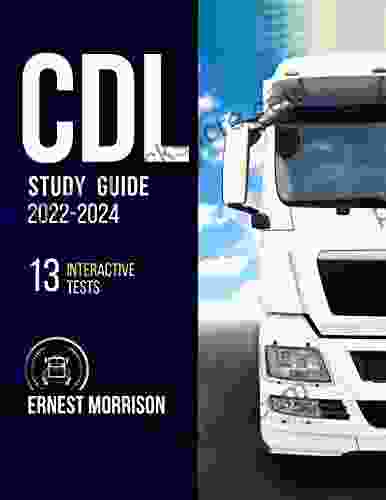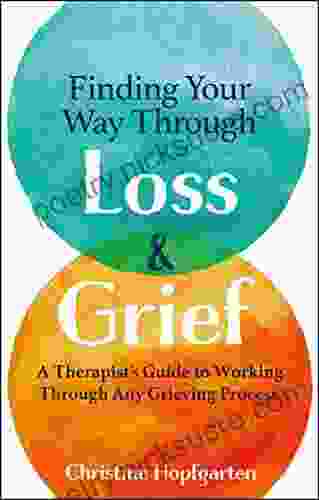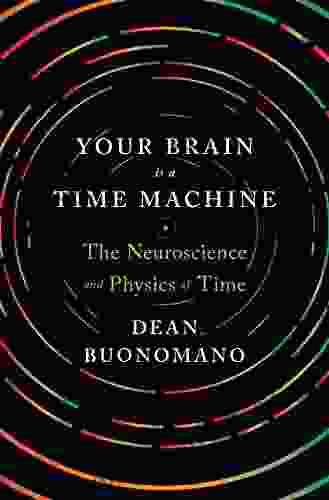Delving into the Perplexing Nexus of Neuroscience and Physics: Unveiling the Enigmatic Nature of Time

4.6 out of 5
| Language | : | English |
| File size | : | 7801 KB |
| Text-to-Speech | : | Enabled |
| Screen Reader | : | Supported |
| Enhanced typesetting | : | Enabled |
| Word Wise | : | Enabled |
| Print length | : | 305 pages |
Time, the seemingly inexorable and omnipresent force that governs our lives, has captivated the minds of philosophers, scientists, and artists throughout history. Its elusive nature has sparked countless debates and investigations, spanning disciplines as diverse as physics, neuroscience, psychology, and philosophy. In this article, we embark on an enthralling journey into the intersection of neuroscience and physics, seeking to unravel the multifaceted nature of time and its profound implications for our understanding of consciousness, reality, and our place within the vast cosmic tapestry.
Time Perception: The Subjective Experience of Time's Passage
Our perception of time is a highly subjective experience, influenced by a multitude of factors, both internal and external. From the moment we are born, our brains are constantly processing and interpreting sensory information, creating a continuous stream of memories and experiences that shape our perception of time's passage. These subjective experiences of time can vary significantly from person to person, and can be further altered by various factors such as age, emotional state, and even the environment in which we find ourselves.
Research in neuroscience has provided valuable insights into the neural mechanisms underlying our perception of time. Studies have identified specific brain regions, such as the hippocampus, prefrontal cortex, and basal ganglia, that play crucial roles in processing temporal information. These regions work in concert to form a complex neural network that allows us to perceive and measure the passage of time, enabling us to make judgments about duration, sequence, and the order of events.
Objective Time: The Measurable and Universal Framework
In contrast to our subjective experience of time, objective time is a concept rooted in the physical world. It is a measurable and universal framework that provides a common reference point for all observers, regardless of their location or personal experiences. In the realm of physics, time is often described as the fourth dimension, alongside the three spatial dimensions (length, width, and height). This concept of time as a fundamental aspect of the universe has been central to the development of scientific theories, from classical mechanics to the theory of relativity.
One of the most significant contributions to our understanding of objective time came from Albert Einstein's groundbreaking theory of relativity. According to Einstein, time is not absolute but is rather relative to the observer's frame of reference. This means that the passage of time can vary depending on the observer's motion and gravitational field. For example, time dilation, a phenomenon predicted by relativity, states that time passes slower for objects moving close to the speed of light or in strong gravitational fields. This counterintuitive concept has been experimentally verified and has important implications for our understanding of the universe.
The Interplay between Subjective and Objective Time
The relationship between subjective and objective time is a fascinating and ongoing area of research. While objective time provides a universal framework for measuring and synchronizing events, our subjective experience of time can often deviate from this external reference. This discrepancy highlights the complex interplay between our internal perception of time and the external world.
Various factors can influence the divergence between subjective and objective time. For instance, our emotional state can significantly alter our perception of time's passage. In moments of high emotion, such as fear or excitement, time may seem to slow down or speed up. Additionally, altered states of consciousness, such as meditation or drug-induced states, can profoundly disrupt our sense of time, leading to experiences of timelessness or altered temporal awareness.
Implications for Consciousness, Reality, and Our Place in the Universe
The exploration of time at the intersection of neuroscience and physics has far-reaching implications for our understanding of consciousness, reality, and our place in the universe. The subjective nature of time perception raises fundamental questions about the nature of consciousness itself. If our experience of time is malleable and influenced by internal factors, what does this reveal about the nature of our conscious awareness?
Furthermore, the interplay between subjective and objective time challenges our conventional notions of reality. If time is not absolute but rather relative to the observer, what does this mean for our understanding of the physical world and our place within it? These profound questions invite us to reconsider the very nature of reality and our relationship to the cosmos.
Exploring the Mysteries of Time through Altered States of Consciousness
Throughout history, humans have sought to transcend the ordinary perception of time through various methods, including meditation, ritual practices, and the use of psychoactive substances. Altered states of consciousness can provide a glimpse into alternative ways of experiencing time, offering insights into the malleability of our subjective experience. Meditation, for instance, has been shown to alter brain activity in ways that promote a sense of timelessness and expanded awareness.
Similarly, psychedelic drugs, such as LSD and psilocybin, have been reported to induce profound changes in time perception, leading to experiences of time dilation, time loops, and even the dissolution of time altogether. These altered states of consciousness can provide valuable insights into the neural mechanisms underlying our perception of time and offer a glimpse into the potential fluidity of our subjective experience.
: Embracing the Enigma of Time
The exploration of time at the intersection of neuroscience and physics is a captivating and ongoing endeavor. The interplay between our subjective perception of time and the objective framework of the universe presents a profound mystery that continues to challenge our understanding of consciousness, reality, and our place within the cosmos. As we delve deeper into the enigmas of time, we are confronted with fundamental questions about the nature of existence and the very fabric of our reality.
Embracing the enigma of time invites us to question our assumptions, explore alternative perspectives, and cultivate a sense of awe and wonder at the complexities of our universe. By continuing to unravel the mysteries of time, we not only gain insights into the workings of our own minds but also embark on a journey of self-discovery and a deeper appreciation for the interconnectedness of all things.
4.6 out of 5
| Language | : | English |
| File size | : | 7801 KB |
| Text-to-Speech | : | Enabled |
| Screen Reader | : | Supported |
| Enhanced typesetting | : | Enabled |
| Word Wise | : | Enabled |
| Print length | : | 305 pages |
Do you want to contribute by writing guest posts on this blog?
Please contact us and send us a resume of previous articles that you have written.
 Fiction
Fiction Non Fiction
Non Fiction Romance
Romance Mystery
Mystery Thriller
Thriller SciFi
SciFi Fantasy
Fantasy Horror
Horror Biography
Biography Selfhelp
Selfhelp Business
Business History
History Classics
Classics Poetry
Poetry Childrens
Childrens Young Adult
Young Adult Educational
Educational Cooking
Cooking Travel
Travel Lifestyle
Lifestyle Spirituality
Spirituality Health
Health Fitness
Fitness Technology
Technology Science
Science Arts
Arts Crafts
Crafts DIY
DIY Gardening
Gardening Petcare
Petcare Robert A Conover
Robert A Conover Anna Ivey
Anna Ivey Geoff Greig
Geoff Greig Gill James
Gill James Silvia M Lindtner
Silvia M Lindtner Livia Bitton Jackson
Livia Bitton Jackson Matthew Locricchio
Matthew Locricchio Todd Radom
Todd Radom John Dickson
John Dickson Asker Jeukendrup
Asker Jeukendrup Nisha Garg
Nisha Garg Annalyn Ng
Annalyn Ng Judy Corry
Judy Corry Ann Marie Brown
Ann Marie Brown Karen Bassie Sweet
Karen Bassie Sweet Morton Manus
Morton Manus Jackie Bolen
Jackie Bolen Ann Zaprazny
Ann Zaprazny Krista Marson
Krista Marson Ralph Waldo Emerson
Ralph Waldo Emerson Anna Wood
Anna Wood Jay Young
Jay Young Eleanor J Sullivan
Eleanor J Sullivan Patricia Ladis
Patricia Ladis Winton Porter
Winton Porter Peter Watson
Peter Watson Sajni Patel
Sajni Patel Steve Oldenburg
Steve Oldenburg L J Martin
L J Martin Susan G Solomon
Susan G Solomon Roy R Grinker
Roy R Grinker Sarah Stodola
Sarah Stodola Dan Koboldt
Dan Koboldt Kyung Won Chung
Kyung Won Chung Trevor Hartman
Trevor Hartman Rick Page
Rick Page Suzanne Girard Eberle
Suzanne Girard Eberle Rutger Bregman
Rutger Bregman Holly Chism
Holly Chism Zoe Moore
Zoe Moore Claire Walter
Claire Walter Helen Adrienne
Helen Adrienne John Murray
John Murray Michael F Nenes
Michael F Nenes Neel Doshi
Neel Doshi Julie Plagens
Julie Plagens Philip Reed
Philip Reed Reinhard Kleist
Reinhard Kleist Paul Bloom
Paul Bloom Pierluigi Barrotta
Pierluigi Barrotta Adil E Shamoo
Adil E Shamoo Ann Mccallum Staats
Ann Mccallum Staats Susan Straub
Susan Straub Sara Dyer
Sara Dyer Worley Faver
Worley Faver John Gignilliat
John Gignilliat Lily Siou
Lily Siou Skeleton Steve
Skeleton Steve Jessa Stone
Jessa Stone Fox Fisher
Fox Fisher James P Sethna
James P Sethna Margaret Rogerson
Margaret Rogerson Malcolm S Thaler
Malcolm S Thaler Rebecca A Moyes
Rebecca A Moyes Rebecca Carroll
Rebecca Carroll Jackson Carter
Jackson Carter Kristina Cowan
Kristina Cowan Dorothy Ours
Dorothy Ours Omari Bouknight
Omari Bouknight Tara Haelle
Tara Haelle M Shawn Copeland
M Shawn Copeland Richard C Schwartz
Richard C Schwartz Philip Gibson
Philip Gibson Creative Guy
Creative Guy Mary E Pearson
Mary E Pearson Alex Bromley
Alex Bromley Christina Henry De Tessan
Christina Henry De Tessan Suzanne I Barchers
Suzanne I Barchers Daphne Poltz
Daphne Poltz Lina Beard
Lina Beard Melvin Fitting
Melvin Fitting Paulo Guillobel
Paulo Guillobel Mike Roberts
Mike Roberts Pradeepa Narayanaswamy
Pradeepa Narayanaswamy Jonathan Pd Buckley
Jonathan Pd Buckley Julia Galef
Julia Galef Justine Gregory Williams
Justine Gregory Williams Lily Dunn
Lily Dunn Peter Hathaway Capstick
Peter Hathaway Capstick John Edwards
John Edwards Illysa R Foster
Illysa R Foster Jenna Evans Welch
Jenna Evans Welch Sally Black
Sally Black Steve Bowkett
Steve Bowkett June Hur
June Hur James C Zimring
James C Zimring Anna Bright
Anna Bright Helen E Lees
Helen E Lees Wayne C Booth
Wayne C Booth Ling Seto
Ling Seto Dr Harper
Dr Harper Marie Cirano
Marie Cirano Julie C Meloni
Julie C Meloni Anna Della Subin
Anna Della Subin Tyler Richards
Tyler Richards Maggie Downs
Maggie Downs Joey Myers
Joey Myers Les Livingstone
Les Livingstone Lisa Randall
Lisa Randall Barb Musick
Barb Musick Sandy Bodeau
Sandy Bodeau Jeff Kuehl
Jeff Kuehl Gemma Bray
Gemma Bray Martin N Seif
Martin N Seif Bethany Saltman
Bethany Saltman James C Scott
James C Scott Arcturus Publishing
Arcturus Publishing Richard Mcafee
Richard Mcafee Breeda Bermingham
Breeda Bermingham Jenny Jacobs
Jenny Jacobs Roy M Wallack
Roy M Wallack Peter Wacht
Peter Wacht Bob Cary
Bob Cary John Yates
John Yates Michael Labossiere
Michael Labossiere Peter Richmond
Peter Richmond James Burke
James Burke Chris Bailey
Chris Bailey Boye Lafayette De Mente
Boye Lafayette De Mente Danny Jones
Danny Jones Barry Dainton
Barry Dainton Gloria Chadwick
Gloria Chadwick Jonathan Franklin
Jonathan Franklin Richard A Swanson
Richard A Swanson Hanumant Deshmukh
Hanumant Deshmukh Caryl Phillips
Caryl Phillips Kendall Coyne
Kendall Coyne Lexi Ryan
Lexi Ryan Johnny Chuong
Johnny Chuong Stefanie Japel
Stefanie Japel Barbara Sealock
Barbara Sealock Christopher T Coughlin
Christopher T Coughlin Hannah Testa
Hannah Testa Buddy Lee
Buddy Lee Chase Hassen
Chase Hassen Stephen Tarsitano
Stephen Tarsitano Sean Purchase
Sean Purchase Christine Hopfgarten
Christine Hopfgarten Ellen Painter Dollar
Ellen Painter Dollar Robert A Cook
Robert A Cook Ray Eye
Ray Eye Barry Schwartz
Barry Schwartz Tim Cahill
Tim Cahill Dave Hall
Dave Hall Julian Of Norwich
Julian Of Norwich G Norman Lippert
G Norman Lippert Carl Mckeating
Carl Mckeating Prime Hall
Prime Hall Barak A Bassman
Barak A Bassman Ruby Mcconnell
Ruby Mcconnell Freddy Silva
Freddy Silva Mark Mckinney
Mark Mckinney H Jerome Chapman
H Jerome Chapman William Goldman
William Goldman Susan M Schneider
Susan M Schneider Darryl Belfry
Darryl Belfry Randy J Paterson
Randy J Paterson Anna Grafl
Anna Grafl C W Farnsworth
C W Farnsworth Jennifer L Lopez
Jennifer L Lopez Aaron Mahnke
Aaron Mahnke David Woods
David Woods Junior Health Institute
Junior Health Institute Damian Hall
Damian Hall Valerie Hansen
Valerie Hansen W W Sawyer
W W Sawyer Ichigo Takano
Ichigo Takano Steve Olson
Steve Olson Darcie Little Badger
Darcie Little Badger Finn Aagaard
Finn Aagaard David Soucie
David Soucie Maya Van Wagenen
Maya Van Wagenen Larry Thornberry
Larry Thornberry Joe Hyams
Joe Hyams Steven G Krantz
Steven G Krantz Noel D Justice
Noel D Justice Suzanne Clark
Suzanne Clark Good Books
Good Books Alexander L Chapman
Alexander L Chapman George James Grinnell
George James Grinnell Kalman Samuels
Kalman Samuels Paul Logothetis
Paul Logothetis Nicholas Thomas
Nicholas Thomas Dave Canterbury
Dave Canterbury Peter L Falkingham
Peter L Falkingham Steve Schwartz
Steve Schwartz Chronicle Books
Chronicle Books Fumio Sasaki
Fumio Sasaki Joanna Wells
Joanna Wells Linda K Miller
Linda K Miller Bernard Stiegler
Bernard Stiegler Anna Watson
Anna Watson Graham Robb
Graham Robb Michael G Manning
Michael G Manning Katie Krimer Ma Lcsw
Katie Krimer Ma Lcsw Richard Appleton
Richard Appleton Gilbert J Grant Md
Gilbert J Grant Md Joyce Meyer
Joyce Meyer Margaret Paul
Margaret Paul Ray Moynihan
Ray Moynihan Bren Smith
Bren Smith Wendy Leo Smith
Wendy Leo Smith P M Gilbert
P M Gilbert Eddie Jones
Eddie Jones Geryn Childress
Geryn Childress Patricia Romanowski Bashe
Patricia Romanowski Bashe Stephen J Pyne
Stephen J Pyne Louise Katz
Louise Katz Kass Morgan
Kass Morgan Annaka Harris
Annaka Harris Pawel Malczewski
Pawel Malczewski Gary Chapman
Gary Chapman Zach Codings
Zach Codings Charles J Sanders
Charles J Sanders Sean Bartram
Sean Bartram Tali Sharot
Tali Sharot Jennifer Dugan
Jennifer Dugan Earl Hipp
Earl Hipp College Hippo
College Hippo Lane Demas
Lane Demas Horace Freeland Judson
Horace Freeland Judson Lizzie Collingham
Lizzie Collingham Todd Denault
Todd Denault Cathy Glass
Cathy Glass Genevieve Mckay
Genevieve Mckay Walter Mischel
Walter Mischel Robert F Boszhardt
Robert F Boszhardt Peyton Curley
Peyton Curley L A Cotton
L A Cotton Nelson Dellis
Nelson Dellis Luke Schumacher
Luke Schumacher Jonathan R Brennan
Jonathan R Brennan Emmett W Hines
Emmett W Hines Stan Gibilisco
Stan Gibilisco Mikael Lindnord
Mikael Lindnord Ben Shneiderman
Ben Shneiderman Ford R Bryan
Ford R Bryan Anna B Doe
Anna B Doe Isaac Fitzsimons
Isaac Fitzsimons Donna D Ignatavicius
Donna D Ignatavicius Becky Wade
Becky Wade David Berry
David Berry Dean Buonomano
Dean Buonomano Mishka Shubaly
Mishka Shubaly Zach Davis
Zach Davis Brian Daccord
Brian Daccord Richard A Ruth
Richard A Ruth Steve Bennett
Steve Bennett Sukhveer Singh
Sukhveer Singh Oskar Morgenstern
Oskar Morgenstern Charlene Beswick
Charlene Beswick Kristian Berg
Kristian Berg Mordecai Orimiladeye
Mordecai Orimiladeye Sally Connolly
Sally Connolly Scott P Sells
Scott P Sells Dr Sarita Uhr
Dr Sarita Uhr Ian Moulding
Ian Moulding M Terese Verklan
M Terese Verklan Dannah Gresh
Dannah Gresh Angela Saini
Angela Saini Daniel Isberner
Daniel Isberner Paul Mendelson
Paul Mendelson Jay Allan
Jay Allan Anna Lowenhaupt Tsing
Anna Lowenhaupt Tsing Jay Spence
Jay Spence Crystal Cook
Crystal Cook Stacey Williams
Stacey Williams Steve Newell
Steve Newell Katharine Beals
Katharine Beals Jack Perconte
Jack Perconte Sam Demas
Sam Demas Steven Munatones
Steven Munatones Sharon Rowley
Sharon Rowley Jacob Ward
Jacob Ward Anna Flores Locke
Anna Flores Locke Anna Crowley Redding
Anna Crowley Redding Frank Thomas
Frank Thomas Stuart Tomlinson
Stuart Tomlinson Heidi Kreider
Heidi Kreider Sherry B Ortner
Sherry B Ortner Kate Mcvaugh
Kate Mcvaugh Will Kurt
Will Kurt Steven Callahan
Steven Callahan Roger Hall
Roger Hall Matthew Rudy
Matthew Rudy Mike Reilly
Mike Reilly Ken Robinson
Ken Robinson Antonio Robert
Antonio Robert J Scott Long
J Scott Long Tony Osgood
Tony Osgood Zena Hitz
Zena Hitz Victor Stringer
Victor Stringer Janine Marsh
Janine Marsh Melanie Dickerson
Melanie Dickerson Glen E Clarke
Glen E Clarke R K Agarwal
R K Agarwal J E Esslemont
J E Esslemont Jill Lepore
Jill Lepore Susan Spicer
Susan Spicer Hope Comerford
Hope Comerford Quinn Loftis
Quinn Loftis Robert Gerver
Robert Gerver Cade Courtley
Cade Courtley Stacey A Shannon
Stacey A Shannon Jemar Tisby
Jemar Tisby Kennedy Achille
Kennedy Achille Annette Burns
Annette Burns Chic Scott
Chic Scott Marjorie Savage
Marjorie Savage Jacqueline Winslow
Jacqueline Winslow Shannon Vallor
Shannon Vallor Harold Davis
Harold Davis Michael Witwer
Michael Witwer Holly Bourne
Holly Bourne Gwen Mckee
Gwen Mckee Jason
Jason Dante Fortson
Dante Fortson Howard Means
Howard Means Joshua Shifrin
Joshua Shifrin Sean Covey
Sean Covey Steven A Fino
Steven A Fino Julian Havil
Julian Havil Melissa Mortenson
Melissa Mortenson Scott Allan
Scott Allan Tanmay Mehta
Tanmay Mehta Clive Scarff
Clive Scarff Craig Ramsay
Craig Ramsay Chris Fregly
Chris Fregly Christine Field
Christine Field Elisabeth Haich
Elisabeth Haich Louis Van Dyke
Louis Van Dyke Sara Wickham
Sara Wickham Stefan Hollos
Stefan Hollos Guy Windsor
Guy Windsor John O Sullivan
John O Sullivan Randall Fitzgerald
Randall Fitzgerald L J Smith
L J Smith Emily J Taylor
Emily J Taylor Zach Hunter
Zach Hunter Bert Mendelson
Bert Mendelson Martin Meredith
Martin Meredith Steven Yellin
Steven Yellin Stephanie Cave
Stephanie Cave Tim Young
Tim Young Sheela Raja
Sheela Raja Harnarayan Singh
Harnarayan Singh Illustrated Edition Kindle Edition
Illustrated Edition Kindle Edition Seth Stephens Davidowitz
Seth Stephens Davidowitz Rick Sparkman
Rick Sparkman H M Schey
H M Schey Julie A Ross
Julie A Ross Jennifer Kostick
Jennifer Kostick Linda Lewis Alexander
Linda Lewis Alexander Steve Grant
Steve Grant Cb Droege
Cb Droege Robin Esrock
Robin Esrock Bob Madgic
Bob Madgic Dan Gardner
Dan Gardner Lisa Manterfield
Lisa Manterfield Margaret Jean Langstaff
Margaret Jean Langstaff Ellen Dugan
Ellen Dugan Dan Vogel
Dan Vogel Bruce Lockwood
Bruce Lockwood Robby Weber
Robby Weber C J Brown
C J Brown Michael Tan
Michael Tan Kristen L Mauk
Kristen L Mauk Jenn Bennett
Jenn Bennett Frances Schultz
Frances Schultz William P Young
William P Young Horace Kephart
Horace Kephart Dave Whitlock
Dave Whitlock Mark Matlock
Mark Matlock The Pinnacle Review
The Pinnacle Review Anne Sylvie Malbrancke
Anne Sylvie Malbrancke Sharman Apt Russell
Sharman Apt Russell Timothy P Schultz
Timothy P Schultz Ann Valett
Ann Valett Joy Dawson
Joy Dawson Ann Voskamp
Ann Voskamp Miley Smiley
Miley Smiley Sparknotes
Sparknotes Matthew Cobb
Matthew Cobb Shawn Shallow
Shawn Shallow Hill Harper
Hill Harper Tarani Chandola
Tarani Chandola Helge Kragh
Helge Kragh Curtis Collins
Curtis Collins Sandy Camillo
Sandy Camillo Christopher Seddon
Christopher Seddon Annabel Streets
Annabel Streets Elizabeth Wissner Gross
Elizabeth Wissner Gross Marva Boatman
Marva Boatman Michael Burnett
Michael Burnett Charles Dickens
Charles Dickens Ariel Dalfen
Ariel Dalfen Vladimir Vasiliev
Vladimir Vasiliev Harley Mcallister
Harley Mcallister Lori L Tharps
Lori L Tharps Shelley Emling
Shelley Emling E R Truitt
E R Truitt Ralph Cockburn
Ralph Cockburn John Pullen
John Pullen Naomi Tomky
Naomi Tomky Dana James
Dana James Dave Hughes
Dave Hughes George Lakoff
George Lakoff John Van Wyhe
John Van Wyhe R A Salvatore
R A Salvatore Jean Barbre
Jean Barbre Sally Annjanece Stevens
Sally Annjanece Stevens Bob Labbe
Bob Labbe Thomas A Garrity
Thomas A Garrity James F Twyman
James F Twyman Larry Semento
Larry Semento Nancy Marie White
Nancy Marie White L Chapman
L Chapman Anna Quindlen
Anna Quindlen Christelle Dabos
Christelle Dabos Julie Creffield
Julie Creffield Neal Shusterman
Neal Shusterman Vittal S Anantatmula
Vittal S Anantatmula Laurie Varga
Laurie Varga Josephine Mccarthy
Josephine Mccarthy Michael Hodgson
Michael Hodgson Patrick Torsell
Patrick Torsell Eric Greitens
Eric Greitens Henry Dillon
Henry Dillon Nicholas Clapp
Nicholas Clapp John Baichtal
John Baichtal Scott Shupe
Scott Shupe Adele Faber
Adele Faber Douglas Perry
Douglas Perry Timothy Ellis
Timothy Ellis John Dunn
John Dunn Chris Gore
Chris Gore Bella Forrest
Bella Forrest Monroe Wildrose
Monroe Wildrose Caroline Miller
Caroline Miller Kathy Morey
Kathy Morey
Light bulbAdvertise smarter! Our strategic ad space ensures maximum exposure. Reserve your spot today!

 Jack LondonUnderstanding Key Concepts in Accounting and Finance: A Comprehensive Guide...
Jack LondonUnderstanding Key Concepts in Accounting and Finance: A Comprehensive Guide...
 Shaun NelsonDay The Universe Changed James Burke: Exploring the Scientific Revolutions...
Shaun NelsonDay The Universe Changed James Burke: Exploring the Scientific Revolutions...
 Jessie CoxThe Young Chef Cookbook: The Complete Cooking Guide for Kids Who Love to Cook...
Jessie CoxThe Young Chef Cookbook: The Complete Cooking Guide for Kids Who Love to Cook...
 Dalton Foster13 Interactive Tests: Theory and Explanations to Pass the Exam Without Stress
Dalton Foster13 Interactive Tests: Theory and Explanations to Pass the Exam Without Stress Stephen KingFollow ·14.7k
Stephen KingFollow ·14.7k Gil TurnerFollow ·17.9k
Gil TurnerFollow ·17.9k Victor TurnerFollow ·8.6k
Victor TurnerFollow ·8.6k Leo TolstoyFollow ·12.5k
Leo TolstoyFollow ·12.5k Isaac AsimovFollow ·18.3k
Isaac AsimovFollow ·18.3k Dwayne MitchellFollow ·2.5k
Dwayne MitchellFollow ·2.5k W.B. YeatsFollow ·5.2k
W.B. YeatsFollow ·5.2k Dalton FosterFollow ·6k
Dalton FosterFollow ·6k

 Aldous Huxley
Aldous HuxleyMorgenstern: A Classic Tale of True Love and High...
Morgenstern is a...

 Beau Carter
Beau CarterThe Oasis Guide to Asperger Syndrome
What is Asperger Syndrome? Asperger...

 Chadwick Powell
Chadwick PowellFinding Your Way Through Loss Grief: A Therapist S Guide...
Grief is a natural human emotion that we...
4.6 out of 5
| Language | : | English |
| File size | : | 7801 KB |
| Text-to-Speech | : | Enabled |
| Screen Reader | : | Supported |
| Enhanced typesetting | : | Enabled |
| Word Wise | : | Enabled |
| Print length | : | 305 pages |










